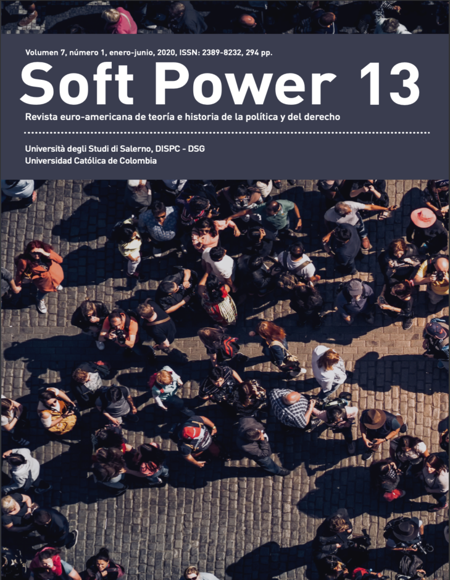
This work is licensed under a Creative Commons Attribution-NonCommercial 4.0 International License.
Al enviar los artículos para su evaluación, los autores aceptan que transfieren los derechos de publicación a Soft Power. Revista Soft Power para su publicación en cualquier medio. Con el fin de aumentar su visibilidad, los documentos se envían a bases de datos y sistemas de indización, así mismo pueden ser consultados en la página web de la Revista.Abstract
En esta sección final consideraremos el impacto de las tecnologías digitales en los espacios urbanos. Por un lado, esto significa cómo los gigantes de la alta tecnología y las empresas de plataformas se están estableciendo en los espacios urbanos como infraestructuras para la acumulación de datos y el desarrollo de servicios, influyendo no sólo en la planificación urbana sino también en el tejido económico y social. Por otro lado, varios actores urbanos —desde municipios hasta habitantes— avanzan hacia el emprendimiento, a menudo utilizando plataformas y datos. Estos procesos plantean nuevos desafíos a la gobernanza local en términos de regulación y participación que vamos a explorar en este artículo. En el primer párrafo enmarcaremos la relación entre los espacios urbanos y las tecnologías digitales haciendo referencia al concepto de ciudad inteligente. En el segundo, nos centraremos en una subjetividad específica que emerge en dicho contexto, el llamado emprendedor urbano. En el tercero, esbozaremos los desafíos y potencialidades para la gobernanza local en la regulación de tales fenómenos.

References
Al Nuaimi, E., Al Neyadi, H., Mohamed, N., & Al-Jaroodi, J. (2015). Applications ofbig
data to smart cities. Journal oflnternet Services and Applications, 6(1), 1-15.
Arnstein, S. R. (1969). A Ladder of Citizen Participation. Journal of the American Planning Association, 35(4), 216-224.
Benjamin, R. (Ed.). (2019). Captivating technology. Race, carceral technoscience, and
Liberatory Imagination in Everyday Life. Durham: Duke University Press.
Cardullo, P., Di Feliciantonio, C., & Kitchin, R. (2019). Toe Right to the Smart City.
Bingley: Emerald Publishing.
Cohen, B., & Muñoz, P. (2016). Toe Emergence of the Urban Entrepreneur: How the
growth of Cities and the Sharing Economy are Driving a New Breed of Innovators.
Westport: Praeger.
Datta, A. (2018). Toe Digital Turn in Postcolonial Urbanism: Smart Citizenship in the
Making of India's 100 Smart Cities. Transactions of the Institute of British Geographers, 43(3), 405-419.
Feige, E. L. (1990). Defining and Estimating Underground and Informal Economies:
Toe New Institutional Economics Approach. World Development, 18(7), 989-1002.
Haar, K. (2018). UnfairBnB: How Online Rental Platforms Use the EU to Defeat Cities'
Affordable Housing Measures. Retrieved from https:// corporateeurope.org/ si tes/ default/files/unfairbnb.pdf
Haid, C. G., & Hilbrandt, H. (2019). Urban Informality and the State: Geographical
Translations and Conceptual Alliances. International Journal ofUrban and Regional
Research, 43(3), 551-562.
Halpern, O., Le Cavalier, J., Calvillo, N., & Pietsch, W. (2013). Test-bed urbanism. Public
Culture, 25(2), 272-306.
Harrison, C., Eckman, B., Hamilton, R., Hartswick, P., Kalagnanam, J., Paraszczak, J., &
Williams, P. (2010). Foundations for Smarter Cities. IBM Journal of Research and
Development, 54(4), 1-16.
Hart, K. (1973). Informal Income Opportunities and Urban Employment in Ghana.
Journal ofModern African Studies, 11(1), 61-89.
Harvey, D. (1989). From Managerialism to Entrepreneurialism: Toe Transformation in
Brban Governance in Late Capitalism. Geografiska Annaler, 71 (1), 3-17.
Hollands, R. G. (2008). Will the real smart city please stand up? City, 12(3), 303-320.
Huws, U. (2019). Labour in Contemporary Capitalism. What Next? Basingstoke: Palgrave MacMillan.
Joss, S., Sengers, F., Schraven, D., Caprotti, F., & Dayot, Y. (2019). Toe smart city as
global discourse: Storylines and critical junctures across 27 cities. Journal of Urban
Technology, 26(1), 3-34.
Komninos. N. (2002). Intelligent Cities: Innovation, Knowledge Systems and Digital
Spaces. London: Spon Press.
McNeill, D. (2015). Global Firms and Smart Technologies: IBM and the Reduction of
Cities. Transactions of the Institute ofBritish Geographers, 40(4), 562-574.
Mette, E. (2015). Brennpunkt Scheinselbststandigkeit. Neue Zeitschrift für Sozialrecht,
(19), 721-726.
Morozov, E. (2013). To Save Everything Click Here: Toe Folly of Technological Solutionism. New York: Public Affairs.
Morozov, E., & Bria, F. (2018). Rethinking the Smart City. Democratizing Urban Technology, in "Rosa Luxemburg Stiftung': City Series, (5).
Murgia, A., Maestripieri, L., & Armano, E. (2016). Toe Precariousness of Knowledge
Workers: Hybridisation, Self-employment and Subjectification. Work Organisation,
Labour & Globalisation, 10(2), 1-8.
Portes, A., & Haller, W. (2010). Toe Informal Economy. In N. J. Smelser & R. Swedberg
(Eds.), Toe Handbook of Economic Sociology (pp. 403-426). Princeton: Princeton
University Press.
Shaw, J., & Graham, M. (2017). An Informational Right to the City? Code, Content,
Control, and the Urbanization oflnformation. Antipode, 49(4), 907-927.
Shelton, T., & Lodato, T. (2019). Actually Existing Smart Citizens: Expertise and (non)
Participation in the Making of the Smart City. City, 23(1), 35-52.
Soderstrom, O., Pasche, T., & Klauser, F. (2014). Smart Cities as Corporate Storytelling.
City, 18(3), 307-320.
Srnicek, N. (2016). Platform Capitalism. Cambridge: Polity Press.
Srnicek, N. (2019, January 19). Rethink the smart city. Retrieved from https://www.
barcelona.cat/metropolis/ en/ contents/rethink-smart-city
Welskop-Deffaa, E. M. (2018). Erwerbsverlaufe digitaler Nomaden. Hybridisierung
der Beschaftigungsmuster in der digitalen Transformation. In A. D. Bührmann, U.
Fachinger, & E.M. Welskop-Deffaa (Eds.), Hybride Erwerbsformen. Digitalisierung,
Diversitat und sozialpolitische Gestaltugsoptionen, (pp. 107-129). Wiesbaden:
Springer.
Willis, K. (2019). Whose Right to the Smart City? In R. Kitchen, P. Cardullo & C. di
Feliciantonio (Eds.), The Right to the Smart City. Bingley: Emerald Publishing.






